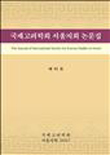1930년대 농민소설에 나타난 계몽적 인간형
The Enlightening Human Type in Korean Peasant Novels of the 1930s
- 국제고려학회 서울지회
- 국제고려학회 서울지회 논문집
- 제1호
-
1999.06275 - 296 (22 pages)
- 58

This study touches upon the ways in which the construction of the narrative in the peasant novels of the 1930s was largely motivated by the Korean peasant movement, which can be interpreted as a social energy to realize the three ways of modemity project(submissive ameliorationism, Marx-Leninism, and nonconformist nationalism) under the reign of Japanese seizure. Following this insight, this study specifically investigates the main characters of Lee Kwangsu’s 〈Hyeok〉, Lee Kiyoung’s 〈Kohiang〉, and Sim Hun’s 〈Sangroksu〉, all novels about the homecoming of enlightening reason, from the special point of the relationship between subject and reality. The study has shown that Huh Sung in 〈Hyeok〉 represents the image of an intellect who is regressed into the realm of the instrumental reason of Japanese imperialism, Kim Hijun in 〈Kohiang〉 reflects the image of an intellect who has a intimate relationship with the peasants, and Park Dongheuk in 〈Sangroksu〉 shows the image of an intellect who is devoted to the ideal of national community. This conclusion bears witness to the fact that the three ways of modernity project receive a practical testimony in each of the narrative discourses.
1. 머리말
2. 계몽적 이성의 귀향
3. 농촌현실 속의 계몽적 지식인
4. 맺음말
참고 문헌
(0)
(0)